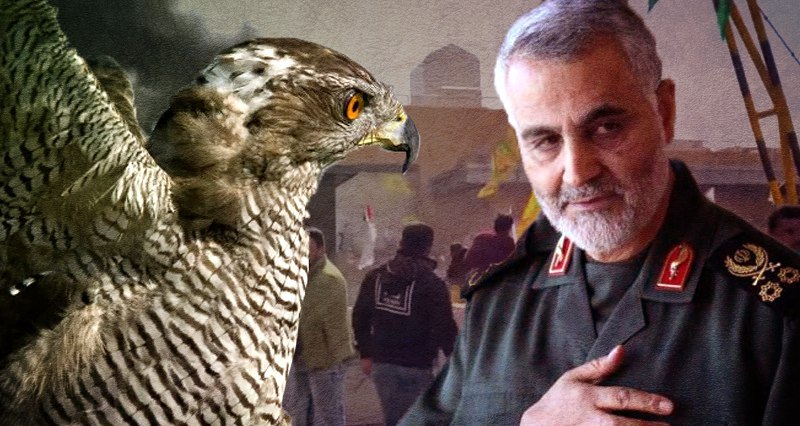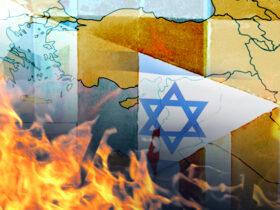Last year brought surprises from the very beginning, and this year promises to be no different. Since the very beginning of 2019, one of the most discussed events was the storming of the American Embassy in Baghdad on January 31. Although it is only the third day of 2020, tragedy has already struck the Iranian people: American air strikes in Baghdad killed a national hero, the Commander of the IRGC’s Quds Forces, Qassem Soleimani.
In October, Tehran said it had foiled a plot by Israeli and Arab agencies to kill Soleimani… but the plot has now become a harrowing reality.
“He’s irreplaceable for Iran,” one of the senior U.S. officials told the Washington Examiner. “There is no new boss who would be the same,” he added.
What will happen now, after the murder of one of the most charismatic and influential people in the Middle East, given the level of tension between the United States and Iran?
Soleimani’s role
Qassem Soleimani is a hero to the Iranians. Soleimani was born in eastern Iran, coming from a poor family, he had first military experience during the Iranian Revolution of February 1979 when he joined the Guardian Corps. He became leader of the Iran’s Quds Force in 1988. As a young but already experienced military figure, he began to fulfill tasks outside Iran: he led numerous secret military operations, and recently fought actively and successfully against ISIS terrorists across the Middle east. Under his leadership, the Quds Force provided support for Hamas and Hezbollah in Palestine and Libya, as well as to pro-Iranian forces in Iraq.
Following the outbreak of civil war in Syria in 2011, Soleimani ordered some of his Iraqi militia to come to Syria to protect the Al-Assad Government. In many ways, he played a role in the Syrian war by helping President Bashar al-Assad turn the situation around and take back some of the territory from the rebels.
During Iraq’s struggle against ISIL, al-Hashd al-Shaabi (The Popular Mobilization Forces), partly under Soleimani’s control, fought alongside the Iraqi military to defeat the terrorists.
In July 2018, Soleimani was directly challenged by US President Donald Trump, who warned that Iran would “suffer the consequences” if Tehran threatened Washington.
He was the right hand of the Iranian Supreme Leader of Ayatollah Ali Khamenei.
We must now ask ourselves: how would we react if someone killed right hand of the President, or the Secretary of State, or the Director of National Intelligence? The war would already have begun.
Chronology of conflict
What is the US’ excuse for killing the popular hero of Iran?
On December 29, the United States attacked Kataib Hezbollah’s positions, killing at least 25 fighters and injuring at least 38 people.
Washington said the decision to bomb was made in connection with “repeated attacks by Kataib Hezbollah on Iraqi bases.” The Pentagon said the attacks were a “response” to a movement that killed one American citizen and injured several military personnel in Kirkuk.
In response, on January 31, protesters attempted to storm the main gate of the U.S. Embassy in Baghdad in the green zone area of the Iraqi capital, where diplomatic and government agencies are located.
Protests outside the embassy began immediately after the funeral of people killed by US airstrikes. The rally continued Wednesday and U.S. troops used tear gas against demonstrators.
Reactions
“All enemies should know that the jihad of resistance will continue with a doubled motivation, and a definite victory awaits the fighters in the holy war,” Iranian Supreme Leader Ayatollah Ali Khamenei said in a televised statement.
Foreign Minister Javad Zarif called Soleimani’s assassination “an act of international terrorism”.
The US bears responsibility for all consequences of its rogue adventurism, he said.
The US' act of international terrorism, targeting & assassinating General Soleimani—THE most effective force fighting Daesh (ISIS), Al Nusrah, Al Qaeda et al—is extremely dangerous & a foolish escalation.
The US bears responsibility for all consequences of its rogue adventurism.
— Javad Zarif (@JZarif) January 3, 2020
Opinions within the American elite diverged. Congress had two reactions: 1. that “Trump killed terrorist commander who killed American citizens,” or 2. “it looks like Trump has just started a major war with Iran.”
The Republicans were more excited about Soleimani’s death, while the Democrats (also taunting him and calling him a “terrorist”) used the situation to criticize Trump for pushing the countries to the brink of war.
Democratic presidential candidates on Thursday warned that the killing of Iranian General Qassem Soleimani could spark an escalation of violence in the Middle East, and that Iran was likely to respond in turn.
Joe Biden called Trump’s move an escalation, but remained firm in his anti-Iranian attitude.
Bernie Sanders said that Trump’s decision brings us closer to “another disastrous war in the Middle East that could cost countless lives and trillions more dollars.”
Elizabeth Warren, while insulting Soleimani, added that this “reckless move escalates the situation with Iran.”
Soleimani was a murderer, responsible for the deaths of thousands, including hundreds of Americans. But this reckless move escalates the situation with Iran and increases the likelihood of more deaths and new Middle East conflict. Our priority must be to avoid another costly war.
— Elizabeth Warren (@ewarren) January 3, 2020
Sen. Lindsey Graham was openly excited about Soleimani’s murder and even praised Trump for the decision.
I appreciate President @realDonaldTrump’s bold action against Iranian aggression. To the Iranian government: if you want more, you will get more.
— Lindsey Graham (@LindseyGrahamSC) January 3, 2020
If Iran continues to attack America and our allies, they should pay the heaviest of prices, which includes the destruction of their oil refineries.
— Lindsey Graham (@LindseyGrahamSC) January 3, 2020
To the Iranian government: If you want to stay in the oil business leave America and our allies alone and stop being the largest state sponsor of terrorism in the world.
— Lindsey Graham (@LindseyGrahamSC) January 3, 2020
Other Senators reactions are more or less similar:
Qassem Soleimani masterminded Iran’s reign of terror for decades, including the deaths of hundreds of Americans. Tonight, he got what he richly deserved, and all those American soldiers who died by his hand also got what they deserved: justice. https://t.co/1wkjtvj2QA
— Tom Cotton (@SenTomCotton) January 3, 2020
Qassem Soleimani was an evil and deadly terrorist with the blood of thousands, including hundreds of Americans, on his hands. @realDonaldTrump was right to order decisive action to kill Soleimani to prevent further attacks and defend American lives and interests.
— Liz Cheney (@Liz_Cheney) January 3, 2020
The justification for the assasination is to “deter future Iranian attacks”.
One reason we don’t generally assasinate foreign political officials is the belief that such action will get more, not less, Americans killed.
That should be our real, pressing and grave worry tonight.
— Chris Murphy ???? (@ChrisMurphyCT) January 3, 2020
President Trump is bringing our nation to the brink of an illegal war with Iran with no congressional approval.
Passing our bipartisan amendment to prevent unconstitutional war with Iran is urgent. Congress needs to step in immediately. https://t.co/tBFRwQMp51
— Archive: Senator Tom Udall (@SenatorTomUdall) January 3, 2020
If you think taking out bad guys is it’s own justification, you need to reflect on the chaos that followed our destruction of Hussein and Qaddafi, neither of whom commanded nation-states when they died. 2/5
— Jim Himes ???????????????????????????????? (@jahimes) January 3, 2020
A trigger happy armchair strongman, lacking congressional authority, has recklessly brought our nation closer to war.
— Rep. Hank Johnson (@RepHankJohnson) January 3, 2020
Globalist experts, criticizing Soleimani and considering him a “terrorist,” commented extensively on the event. For example, Mark Dubowitz said it’s like losing a “JSOC commander, CIA director & foreign minister — all at once.” Soleimani’s death will have more consequence than the deaths of Osama bin Laden and ISIS leader Abu Bakr al-Baghdadi, he added.
If your view is Suleimani can easily be replaced, you know nothing about how he has completely dominated QF & IRGC for 20 yrs.
Ops, intel, foreign relations, political warfare, strategy.
It’s like losing your JSOC commander, CIA director & foreign minister — all at once.
— Mark Dubowitz (@mdubowitz) January 3, 2020
No matter how demonized Soleimani was in the foreign press, even his enemies recognized him as one of the most powerful people in the Middle East.
Geopolitics
Geopolitically, a major conflict is brewing. The US’ goal is to prevent the rapprochement of Iran and Iraq, and to weaken Iran’s influence in the region, which is why Washington is deliberately bombing positions and provoking the Iranian response, forcing the Iraqi leadership to respond to the challenges as well.
By killing Soleimani, the United States is provoking new unrest in Iranian and pro-Iranian circles. Iran has already promised to avenge Soleimani’s death.
The former commander of the IRGC, Secretary of the Expediency Council Mohsen Rezaee warned on Twitter that the IRGC would “take firm revenge” on the death of the “martyred” general.
سپهبد شهید #قاسم_سلیمانی به جمع برادران شهیدش پیوست ولی انتقام سختی از امریکا خواهیم گرفت.#انتقام_سخت
— محسن رضایی (@ir_rezaee) January 3, 2020
The unrest in Iraq began back in October, and in the conflict American and Israeli forces are deliberately pouring oil into the fire. This is an open pretext for harsh action by Iran.
Israel is creating additional hysteria by taking advantage of the noise. Israel has been put on high alert due to possible threats from Iran, and Mount Hermon has been closed to visitors. The Israel Defense Forces (IDF) confirmed this decision on its official Twitter account.
#BREAKING #Israel is on high alert for any #Iran|ian response over the killing of Soleimani. Mount Hermon is closed for visitors
— Guy Elster (@guyelster) January 3, 2020
«The consequences may not come quickly or directly. But they could be enormous.» – Daily Beast said.

















Leave a Reply